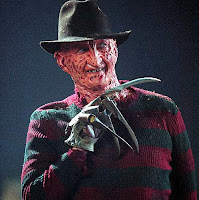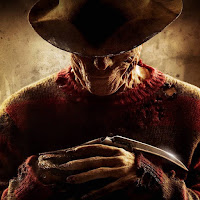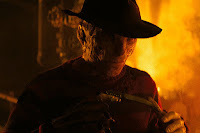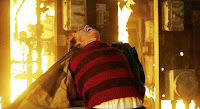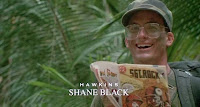If you didn’t know, two weeks ago was the twenty-eighth anniversary of the first
Predator movie. Amazing, isn’t it. There are probably some of you reading this who have never known a Predator-free world…
Anyway…
 I mentioned this fact on the fan page that day, which led to a bunch of responses, and some of those led to me saying (in the loud way you can do when you have a fan page) that I actually liked Predators, the sequel with Adrian Brody, Alicia Bragg, Topher Grace, Laurence Fishburne,
I mentioned this fact on the fan page that day, which led to a bunch of responses, and some of those led to me saying (in the loud way you can do when you have a fan page) that I actually liked Predators, the sequel with Adrian Brody, Alicia Bragg, Topher Grace, Laurence Fishburne,
A few years back, while I was still writing for the magazine, I leaped at a chance to do an article about Predators. While many folks still love that original film, lot of people didn’t like the sequels, or the AvP movies, or the short-lived Saturday morning cartoon. And I knew Robert Rodriguez was attached to this new project, so I figured there had to be at least a one-page article there, maybe even two.
There was no Saturday morning cartoon. I was just seeing if you were paying attention.
The idea flew and a few weeks later I ended up over at 20th Century Fox talking with the two screenwriters, Alex Litvak and Mike Finch. They’d pulled their dream job, writing a big-budget sequel to the 1987 action/ sci-fi classic, and they were more than willing to talk at length. It’s worth noting that I was face-to-face with Alex for this interview while Mike joined us on speakerphone. Because of this, Alex tended to dominate a bit just because Mike, without any visual clues, was left unsure of when he could jump in.
A few of my standard points, but you’ll probably figure it out as it goes. I’m in bold, asking the questions. Keep in mind a lot of these aren’t the exact, word-for-word questions I asked (which tended to be a bit more organic and conversational), so if the answer seems a bit off, don’t stress out over it. If you see a long line of dashes (———-) it means there was something there I didn’t transcribe, probably because it was just casual discussion or something I knew I wasn’t going to use in the final article for one reason or another (there are some off the record discussions now and then). Any links are entirely mine and aren’t meant to imply Alex and Mike were specifically endorsing any of the ideas I’ve brought up here on the ranty blog—it’s just me linking from something they’ve said to something similar that I’ve said.
By the very nature of this discussion, there will probably be some
spoilers in here. Check out the movie if you haven’t seen it yet. It’s a fun sequel with some great Predator action. Plus you’ll get a bit more out of this interview.
Material from this interview was originally used for an article that appeared in the July/August 2010 issue of Creative Screenwriting Magazine.
So, anyway, here’s me going after Alex and Mike with questions about Predators
How did you guys start working together?
Alex: I started out in development, spent about ten years working on movies as a production/ development executive, including here at 20th Century Fox. That was my first big break. And then five years was spent at a company called Intermedia, working on a bunch of movies, helping the Germans piss away a lot of … (laughter)
Mike: Yeah, I’d been working for about ten years before this. The very typical screenwriter story. I’d worked on a bunch of projects, sold some specs, several movies had been very close, had worked for most of the studios doing rewrites or assignments, but–that very typical story– none had gotten made. I was definitely a working screenwriter, but somewhat of an unfulfilled working screenwriter. Adequately paying the bills and liking the lifestyle, but not enjoying the success of having a movie made.
A: Mike’s actually a second generation screenwriter. For me this all kind of fresh and new. Mike’s dad and his mom created
Dirty Harryand
Ice Station Zebra.
M: And I’ve been living off that ever since. (laughs)
How did you guys get on board Predators? Wasn’t Robert Rodriguez just going to write it himself at one point? When was this?
 A:
A: This actually, for me, goes back aways. When I worked here, at the time I was just obsessed with the idea of doing another Predator movie. The original is so iconic ad the second one was kind of a misstep. I felt there was another great tale to be told. At the time we {studio) were doing
Alien: Resurrection, which didn’t quite work. They’re both kind of in the same wheelhouse, and the idea of doing another
Predator movie without Arnold was kind of “ehhhh.” So that never materialized. Just as I was making the transition to screenwriting…. You come up with these ideas just as a fanboy. ‘Wouldn’t it be cool to do a Bond movie where Bond does X?’ It was a moment like that with a Predator movie. ‘Wouldn’t it be cool to see a Predator movie where Y happens?’ At the time I hadn’t written or sold anything, so I just filed it away.
Cut to present day, 2009, right after
Medieval, we walk into a room at Fox and sat down with Drew Crevello, who was a huge fan of the script. We started talking about what’s next, we were completely available, and he says ‘
Predators. We’re reviving this movie.’ It was an old script by Robert Rodriguez who I think wrote it in ’94, fresh off
Desperado. At the time it was wildly expensive and taking the franchise to a cool other level, but not sort of do-able at the time. So Alex Young found the script and wanted to revive it with Robert, but they were looking for other screenwriters to come in and polish it off. Reinvent the reinvention. So it was around the same time last year, May of 2009, that we got the job.
As fans you’ll always kind of go ‘Wouldn’t it be cool to do this?’ Isn’t that the reason why we are in this business—to tell the stories
in the mythology, in the genre, with
the characters we love? It’s every fanboys dream and we got a chance to live it. Only to discover, of course, that once you get the prize there’s all this hard work and blood and tears and sweat.
M: And Fox and Drew Crevello and Alex Young and Robert Rodriguez and later on Nimrod Anatal, the director, were very supportive. They wanted not to make a retread of the original, nor did they want a reboot. They wanted a reinvent the franchise. They wanted to take something that was incredibly fresh at the time that had become somewhat stale over the last fifteen years. Essentially give it a fresh start in the world. To their credit they were very supportive of letting us take Robert’s original document and poach those elements that were workable and good, especially with the specific budget constraints that they had, and make it into something new and fresh. We were told to write a sequel that feels like an original.
What was that original thought you came up with? The ‘wouldn’t it be cool…’
 A:
A: There was a bunch of things. One is the idea that up until now you’ve only seen one variety of Predator. One of the big ideas was it’s Predator vs. Predator. What was interesting to us is you’ve met this one variety of intergalactic hunters, but what if there are others? Other tribes, other clans. If those guys are like samurai– very traditional, for centuries they’ve been hunting with the same weapons, the same tactics, the same code–there’s another clan which are more like, say, ninjas. They’re more technologically evolved. They have falcons, they have dogs, they have all this crazy equipment and toys that are going to make the original Predator look like an 8-Track competing with an iPod. And those two clans are at war. So the idea of two clans, of clan warfare, was one of the things we came up with.
M: A second one was the idea of putting a group if human beings in a no-win situation, a true crucible, was very intriguing to us. We also liked this conceit that in the original you had a well-oiled machine, a crack team, going up against one of these. In this version we wanted to put a group of very disparate individuals. All highly skilled, all tactically proficient, all killers in their own right. Really… all predators in their own right. Human predators. And we wanted to see what would happen to those characters when they were put under true duress. These were people who were dominant and dangerous in a human environment. Taken out of that environment and put somewhere else, in a sense being turned from Apex predator to prey, what would happen to them? How would they break down? Would they experience
cowardice? Fear? Would they curl up in a ball and die? Surrender? Stand and fight? It really let us explore seven different ways into true fear.
 A:
A: And there’s the third piece which is
the setting, which is—not giving anything away–not only an alien planet but an alien hunting preserve. Prior to us getting the job I had a conversation about it independently with one of the other producers on the franchise and pitched the idea of going to the stars. He was like “Ehhhh,
Predator is a very terrestrial franchise. Up until now it’s all been on Earth.” So that idea never flew. Ironically, when we sat down with Drew, it turns out Robert, independently, has been talking about going to the stars, because it seemed like the natural place to go.
So the three things we brought to the table. One was new Predators. Two was new human protagonists that Mike was talking about. The Dirty Dozen approach. The Unmagnificent Seven. And three was a new setting. So effectively you have the construct of the first movie, but it’s different Predator, different humans, different jungle.
Since the original came out twenty-odd years ago, there’s been the sequel, a bunch of material from Dark Horse that a lot of people took as canon, the two vs. Aliens movies that seem to loosely follow the Dark Horse ideas… Did you use any of that material?
A: No. I’ve seen the
AvP movies and I feel… I was disappointed.
Predator 2 was a disappointment, too. The original is the original. The original is this iconic bar that you try to measure up to. I’m not sure if we have succeeded. I’m not sure if anyone can succeed. It’s this lean, mean piece of cinematic mastery. It’s Arnold at his best. It’s John MacTiernan at his best. I don’t know if anyone can truly measure up to it, but at the least we were very conscious that we were going to try our best. What was fun about the process was everybody who was part of it grew up on the original movie. Everybody was saying ‘Let’s not be lazy. Of course we can do another Predator movie, but let’s try to give the fans something special.’
We talked a lot about Star Trek, and how JJ was able to give the fans the essence of the original but with these new cool touches that made it fresh and cool again and give the franchise a new life. That’s what we’re hoping to do for Predator.
M: To answer your question, we ignored
Predator 2 and the
AvP series. This is somewhere between a reboot and
a direct sequel to the original
Predator.
 A:
A: We wanted to acknowledge the original existed. There are references to the original in this script. The story of the original gets told by somebody in the group who’s heard about it as an urban legend. A spook story.—— Fundamentally we wanted to take the good
Predator, the one that did it right, and kind of ignore everything else and do the true sequel. As Mike says, the sequel that feels like an original
What’s your process? Are you outline guys, notecard guys, what?
A: Our process is beyond bizarre but it actually works.
M: First part is we don’t actually ever see each other.
A: We’re never in the same room. (laugh) We start by having these endless conversations about what it is, starting from the macro to the very specific. Our styles of writing… I’m incredibly anal and analytical about stuff, to a fault. Mike is very, very fast and goes with his instincts. We sort of balance each other out that way.
So we talk about everything. Kind of build it in our heads. I’m a big fan of putting stuff down on the page because that sort of locks stuff down. Then Mike goes in and does
the very first,very rough pass. In a weird way, when I go after and do a very substantial rewrite, it gets me over the fear of a blank page. I’m looking at a very rough draft of a scene where some things work and some things don’t, but I already know what’s not working. Then he goes after me, cleaning it up and fixing things I missed.
M: But it isn’t like I present Alex with a full script. I’m working about ten or fifteen pages ahead of him. I will start on Monday and I will write ten pages and give it to him and he’ll start rewriting it. Then the next day he can give me those ten pages and I’ll give him the next ten or seven or twelve or whatever. And since we have diametrically opposed schedules–I’m married and I have a five year old. I go to bed at nine but I get up at six or five.
A: When my night is just beginning.
M: It’s like one person working 24 hours a day.
We tend to problem solve quickly while we’re in the process. That’s the upside. That is in large part built on the tens or hundreds of hours we spend time talking about the macro concepts and the micro-specifics, down to left-handed or right-handed. Every beat that ends up on the page has been discussed on some level.
So just to be clear, the two of you never actually outline, but you get enough of it in your heads you can sit down and write?
A: I hate doing those documents, but sometimes I feel like… Sometimes there’s a loose beat sheet. Sometimes we do more structured stuff, especially when you have to present something to a studio, where it helps to lock it down somewhat. It really depends on the job.
M: We do have a working document. It’ll run from ten to fifteen pages. Depending on the situation it’ll either be in beat-sheet form if it’s for us, or it will be in a more literate, compelling form if it’s for a producer to read. There’s always something there. That doesn’t mean that we stick to it, because as you progress things change, characters change, you start to understand them better. You start to get under their skin, they get under yours. The nuances of the script will change, but structurally we pretty much have it nailed before we go in.
A: I think I understand your question better now. Regardless of what form the document is, it’s been outlined and discussed ad nauseum. We never go ‘Let’s just start writing.’ We talk, we figure it out. I think that’s always the fun part of the process. It’s the frustrating part, too, sometimes. That’s where our creative chemistry is strongest, where we constantly challenge each other to come up with something cooler, something we haven’t seen before.
M: We try to keep it fun. The reality is, if the process becomes a grind then it stops feeling light in its feet. It stops being interesting for us. We have a lot of fun. Because we want the audience to have fun. At the end of the day this type of movie, an action horror flick, it’s got to be fun. It’s got to keep the audience on their toes and slightly off-balance. We can only generate that if we’re having interesting, upbeat conversations about it.
How long did it take you to get a first draft?
M: This script was slightly different than others. We can write a good solid draft in eight to ten weeks, a little bit faster provided it isn’t all outlined up and detailed and we don’t go off track.
What happened for the rewrite was we had about ten or eleven days before we had to hand a draft into the studio. The draft that was going to get the OK or not. Nimrod had some substantial ideas, all of them good. Drew Crevello was good enough to give us offices in the basement of Fox. And for ten days we sat together with Nimrod, sort of breaking scenes and rewriting them. Essentially dissecting the script and rebuilding it.
A: It was a true writer’s room. Mike would do his pass, I’d do my pass, and then Nimrod would be sitting right there reading the pages. It was madness. It was a death march to
screenwriter’s bootcamp. But we got it done.
M: It was a very interesting process. We had a relatively strong script, but the changes Nimrod wanted– some of them were budgetary, some of them were taste, some of them were content, some were character– it required that we really delve into the script. To his credit, he sat there 18 hours a day for ten days. Sitting on a couch in the basement of Fox reading our pages as we hand them back and forth, working until four in the morning every day.
We had about a day to go and we realized that we had a very solid script but it was about 10 or 11 pages too short. So we sat there going What are we going to do? We can’t hand in a script that’s 87 pages.
A: I think it was less than that. It was in the 70s.
 M
M: Whatever it was, we were missing a piece, and we didn’t know what it was. We stared at each other and then someone had the idea there’s this guy who’s been on the planet, who is a human being who’s survived. Wouldn’t that be cool? That became the genesis of the Noland character.
A: A Robinson Crusoe character. Named off Tom Hanks in Castaway.
M: Once it came to us I went into my little office, wrote for about four pages, and delivered about 12 pages to Alex. He spent the next ten hours rewriting it. We dropped it in the middle of our script and we had our script.
I got to see a draft from July of 2009…
A: I know which draft you saw. It was an early draft that got leaked. The ten-day draft.
The first draft was a lot more epic. The final set piece in the first draft is a Braveheart-style battle between two Predator clans. As cool as it sounds, unfortunately it was the first thing to go because… we can’t afford it.
M: These were the elements we removed and rebuilt to make it a more refined, tighter story.
A: What you read is what we call the “down, dirty, survival draft.” It was truly mystifying to us, to this day, that people responded so strongly to it. We were just trying…
M: You have to figure after those ten days we had no idea what was good and what wasn’t. The only thing we had faith in at that point was each other. And that was quickly fading. (laughs) ——–To this day I sort of miss that level of intensity.
A:————-
M: This could not have existed without Drew, it does not exist without Nimrod, it certainly doesn’t exist without Robert. To their credit, all three of them handled themselves as true gentlemen. They could’ve bullied us, they could’ve pushed us, but they elected to be collaborative and they were fantastically supportive of the crazy, odd ideas we had.
When is this set? Predator 2 was in the not-too-distant future. We only get a glimpse of Royce in the regular world. There’s a mention of Afghanistan. Where does it line up with the other Predator films? Is this “now”?
A: Yes.
Character-wise, how much did you flesh these guys out? Do you know how Stans ended up in prison? Where Mombasa is actually from? What Hanzo did that cost him his fingertips?
A: Oh sure, yeah.
M: As a matter of fact, Robert asked us after the fact, for the DVD extras and the comic book guys, to write extensive bios on each of these characters. It’s not necessarily in the script but each of these characters has a backstory.
Each of them has a reason they’re there.
Is it tough doing a story where… well, almost every character is kind of evil? They’ve all got varying moral codes, but it’s tough to say there’s a “good guy” anywhere in this story.
A: That’s fun, man. That’s what makes it cool. There’s only so many ways you can write an action hero. But when you have a group you have personalities, you have dynamics, you have conflict.
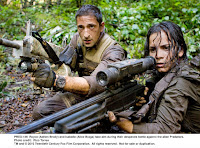 M:
M: Also, we looked at this as a chance to differentiate this class of character. Once you took these people and put them in a no-win scenario, a scenario where they were
goingto die, the walls between them and us–and hopefully between them and the audience–really crumbled. Once they were put in this situation they were able to speak the truth, and like all humans we found that, even with the limited amount of time we had to spend with each of them, they became much more interesting. Each of them had a personal story. Yes, they were killers, but they had families, they had reasons for what they did. More importantly, we gave them the opportunity to face the fact that they were bad men and gave them the chance to either stand up and make it right or to run and die as cowards.
This is why Noland becomes a pivotal character in the piece. He’s a man who has chosen survival above all else. He’s chosen to live above humanity. When our characters look at this guy halfway through the movie, sort of this linchpin moment, and understand that he’s become more animal than human—more Predator than human—they are all asked to make the decision ‘How am I going to go out? Am I going to go out as a human being or as an animal? And is it worth living if you’re going to live like an animal?’ So each of these very hard people with very specific backstories, is each given a chance to make up for the sins they’ve committed. To die well and for a purpose, for a reason. And that reason is each other.
A: And if anything, the Noland character is instrumental in Royce’s arc. Here’s a guy who’s purely about survival. ‘I stick my neck out for no one,’ to quote Humphrey Bogart. This very sort of classic antihero. And then you’ve got two contradictory examples. There’s Isabella, the female sniper, who actually has compassion, who has kindness, who has managed to hold onto her humanity in the middle of all this. And there’s Noland, who’s forsaken it completely. The two examples. Royce finds himself at a crossroads. Is he going to
be like Noland or is he going to be like her?
M: The key here is there’s a crossroads for each of these characters. They all have to make a choice. And they live or die, well or poorly, by virtue of that choice.
A: You don’t have that in the original because they’re soldiers. It’s a homogenized unit. They’re brothers-in-arms who’ve been together through hell and high water. There’s a bond of friendship, a bond of trust. None of that exists here, and that was the fun of it. They come from such different backgrounds. There’s mistrust, there’s tension, there’s friction. New bond are being forged, friendships are being built, but at the same time quarrels and hostilities are constantly igniting because these are predators. It goes back to the title of the movie. It’s not just about the two different varieties of Predators, the humans themselves are predators now. Royce is the ultimate hunter. We had so many versions all with the same idea–you think you’re following a Predator but you’re really following Royce.
M: But all that was lost for a much more startling open.
M: You begin with the guy in free fall. A guy who wakes up, opens his eyes, and he’s falling through space. A parachute deploys…
I saw a draft with two variant endings on it. Ending A, ending B. You look at Casablanca, you look at To Kill A Mockingbird, even stuff like Aliens or Terminator. You can’t picture these stories with different endings. Is it tough to write completely different endings for the same film?

A: Oh, for sure. This was the draft that hopefully gets the greenlight. We were just trying like hell to get through and give the studio something that felt like a movie. There were so many arguments about how it should end. I really fought for the Dutch ending, because I was like ‘We’re going to be there in Westwood when everybody’s going to go nuts when he takes off the mask and it’s Schwarzenegger.’ To this day we actually don’t know which ending was shot. Nimrod felt it would be cool if there was a twist with Isabelle. Down the line there was another ending, more of a seventies movie ending.
M: To answer your question it was not difficult at that point because effectively the movie was over. Those endings were epilogs. We used them as such.
>>note: One version of the film ended with a cameo from Arnold Schwarzenegger’s Dutch, now completely a part of Predator culture and leader of his own tribe. Another revealed that Isabella is also an alien, although not a Predator. Neither of these was used, although the setup for the first version was shot.<<
 Why would I write a dystopian novel? Because they always say, “Write what you know!”
Why would I write a dystopian novel? Because they always say, “Write what you know!” 






